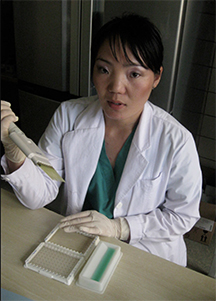Our Focus: Air Pollution and Respiratory Illnesses
Ulaanbaatar the world’s coldest capital city with January averages dropping as low as −30 C (−22 F)
45%
of the country’s 3.39M population lives in the capital of Ulaanbaatar
with much migration since its 1990 independence from the USSR
On
the coldest days of the year, daily average of PM2.5 pollution levels
reach 687 micrograms per cubic meter — 27 times the level WHO recommends
as safe
High respiratory disease rate
UO1 - Research
U01: Main study and two pilot studies Main Study: Comparing Ulaanbaatar (UB) processed coal vs. Darkhan City (DC) raw coal use, does PM exposure weaken the immune defense against respiratory viral infection?
Aim 1: Risk factor study of particulate matter (PM) exposure and respiratory viral infection through a time-series analysis of weekly influenza-like illness (ILI) rates adjusting for potential confounders and co-pollutants (Zhang, Davaalkham,
Bergin, Hoffman, Batzorig B. and Bayarmagnai L).
Aim 2: To examine immunologic and viral responses to personal PM exposure through two parallel panel studies in residents of UB and DC, respectively. Each panel consists of 100-120 nonsmoking adults who will be measured semiannually during
a 3-year follow-up period. ILI counts and immunologic biomarkers will be associated with personal PM exposures (Zhang, Davaalkham, Bergin, Gray, Tighe, DesHusses)
Aim 3: To define the direct effects of PM exposure on epithelial integrity and immune signaling and the subsequent impact on anti-viral responses. This will be achieved through cell culture studies that are directly linked to Aim 2 subjects
(as cell donors). (Tighe, Davaalkham, Zhang, Gray)
Pilot Studies: Explore the effects of PM on pulmonary tuberculosis and bone mineral loss (Hsu-Kim, Zhang, Nomundari B, Davaalkham, Tulgaa)
U2R - Training

Train 25 PhD- or MS-level Mongolian Fellows over 5 years (national search)
Working with their US and Mongolian program faculty, fellows will develop an interdisciplinary research project that is closely tied to the U01research
Each fellow will receive 15 months of financially supported training: 3 months working with US program faculty member at UTMB or Duke University and 12 months performing their project in Mongolia
In a
capstone experience, fellows will present their research to the External Advisory Committee at the Annual Mongolian GEOHealth Hub Review
Goals: publish research and influence Mongolian policy
Accomplishments
MOU signed between UTMB & MNUMS
Subcontract in progress UTMB to Duke
UTMB and MNUMS have hired research coordinators
National search for Mongolian Fellows in progress
Mongolian IRB approval won
Pending actions:
UTMB IRB in progress
November 6-9: GEOHealth Hub leadership meetings in Ulaanbaatar
Recommend External Advisory Committee members to FIC

Partners:
Institute of Veterinary Medicine
National Center for Zoonotic Diseases
Our long term goal is to develop a global health training program that elicits innovative, multidisciplinary team problemsolving solutions to develop products, alter disease processes, and guide policies in controlling zoonotic diseases in Mongolia.